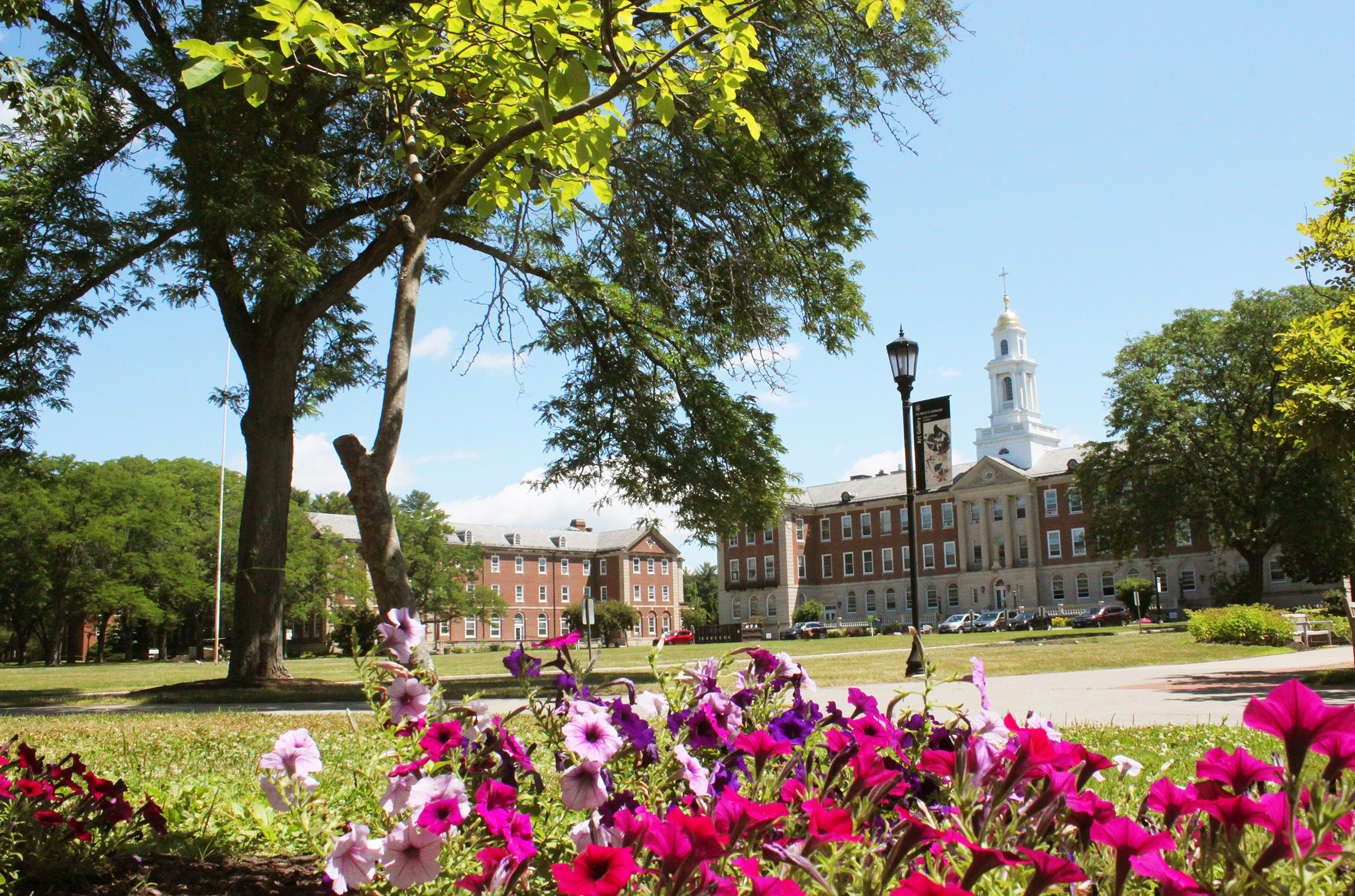What’s Changed at Connecticut Colleges and Universities Since COVID-19?
The leaves in the trees flanking the campus quads haven’t all changed, not just yet. But across the state, we’re seeing significant changes in how universities and colleges kicked off this semester. That is especially true compared to the last two years, when the pandemic was at its worst.
“The biggest changes are structured around COVID-19 regulations,” Nilvio Perez, director of admissions at Southern Connecticut State University (SCSU) in New Haven, told Seasons. “Southern, like most institutions, is mask-optional and there are no vaccine mandates.”
Most, but not all. Here’s what parents need to know.
To Mask or Not to Mask?
Masks that cover the mouth and nose will still be required in classrooms and personal office spaces across the West Hartford campus of the University of Hartford (UHart), unless otherwise specified by the faculty or staff member.
“While some COVID-19 restrictions have been lifted, we will still be closely monitoring cases, offering free testing and holding vaccination clinics throughout the year. We know we may have to put some protocols back into place depending on our campus community’s and state’s needs,” said Katie Kitchens, UHart’s assistant vice president of the Division of Student Success.
“The University of Hartford is looking forward to what we hope will be the most ‘normal’ academic year since the pandemic began. Orientation days for new students were held on campus this summer, rather than virtually; in-person events and programs are back on the calendar; and students will have ample opportunities to get involved on campus, attend programs and meet new people,” Kitchens said.
While undergraduate classes are nearly 100% in person right now, Kitchens updated that UHart is still offering the option of virtual classes for some courses, especially graduate-level courses and courses for adult and part-time students, as well as hybrid options for events and information sessions.
Two of Connecticut’s leading Catholic institutions told their students and faculty that for most of them, masks are not required and vaccinations for COVID-19 are merely “strongly recommended,” with specific exceptions.
For example, students studying to be physician assistants at the University of Saint Joseph (USJ) in West Hartford are required to wear masks, and the university issued a recommendation that anyone not vaccinated wear a mask; however, it is not policy, according to its website.
At Albertus Magnus College in New Haven, the emphasis is on getting students engaged, and giving helicopter parents reasons to stop hovering.
Students Are ‘a Little Bit Terrified’
“The most important thing that both parents and students need to realize is the pandemic itself is waning, but the effects that it had on our students have not waned,” mentioned Andrea E. Kovacs, vice president for enrollment management and marketing at Albertus Magnus. “There are many students that are coming back or coming to campus for the first time this year who were really disrupted during an important period of their development. They weren’t just disrupted academically; they were interrupted and disrupted socially.”
“In order to be successful, you have to be involved in things, right? You’ve got to be involved in clubs or maybe an organization, or you play a sport or some sort of extracurricular activity,” said Kovacs, emphasizing that participation is key. “Those are the things that make the social connections that help you to be successful in other areas.”
“These kids missed most of this, and when they came back to school last year, they really weren’t ready,” added Kovacs. “They didn’t know what to do. They’re a little bit terrified. Parents need to know that their children are struggling. And what I see with parents is that they too are afraid. For most parents, this was the first time they had to teach their children from home and both the parents and students were isolated. And now it all has to change again. We all need to help those kids become involved again, because that’s what will help them be successful.”
Applications and Admissions
“Many colleges pivoted to test-optional admissions during the pandemic, but we had already made that shift a few years ago, so this was not a change due to COVID-19,” said Kitchens about UHart’s admissions process.
SCSU is one of those that transitioned to a test-optional institution for all academic programs, merit scholarship considerations, the direct admit nursing program and the Honors College, according to Perez.
“Other than a broad move to test-optional admission review for all programs, the application process and admission cycle have not changed much,” explained Kimberly M. Crone, M.Ed. and vice president for enrollment management at USJ. What has changed at the university is something Crone has seen trending across the country. “The number of college-bound students has decreased nationally—more undergraduate students are opting to delay college for work.”
Those who are enrolled this semester will find more options outside the classroom at SCSU, commented Perez, with more clubs and affinity organizations, online courses, online social and well-being programming, and opportunities for employment.
Partnerships
“Southern’s BioPath program—a collaboration with the City of New Haven and area bioscience and STEM companies—saw a record number of 28 students placed in internships and full-time jobs during the first half of 2022,” said Perez. “Also, the Regional Water Authority has collaborated with Southern and Gateway on a utilities management program that will train professionals to fill an anticipated dearth of skilled employees and managers at area utility companies in the next five years.”
When inflation hit a 40-year-high this year, many of Connecticut’s universities and colleges pivoted to depend not only on deep-pocketed alumni, benefactors and philanthropists, but local governments, utilities and corporations more than ever before.
“We just inked a major partnership with Yale New Haven Health System that will enable us to double our number of nursing graduates by 26 percent in the next four years, and also increase the representation of nurses of color in this critical area of work force need,” explained Perez.
“We work with a number of organizations to provide better access to higher education, specifically in the state of Connecticut,” said Allison Garris, Ed.D., dean of admissions at the University of Bridgeport. “Students benefit from scholarship opportunities offered by employers and local nonprofits.”
The University of Hartford has also recruited new students for its nursing as well as its engineering programs in the Hursey Center, a new, 60,000-square-foot academic building in the center of campus. The center is filled with laboratories and classrooms, including a health simulation suite and spaces dedicated to preparing future health professionals to assess, diagnose and treat a myriad of conditions.
“UHart recently strengthened its partnership with Trinity Health of New England and received a state grant for a new mobile app design class that will be supported by a local technology firm,” said Kitchens. Other longstanding corporate partners include Stanley Black & Decker, and ESPN.
ESPN, the iconic Bristol-based sports network, also partners with USJ, as does Trinity Health, Hartford HealthCare, The Hartford, Cigna, Pratt & Whitney, and even the Hartford Yard Goats. And that’s not even the entire list.
One year ago, Albertus Magnus hired Eileen Lopez as an employer liaison to expand business partnerships with the Catholic college.
“Her job is to go out and meet one-on-one with employers to help determine what they need, both to upskill their current employees and also what they need from new employees that they’re trying to hire,” said Kovacs. “Most of our corporate involvement on that end is through our chambers of commerce: the Greater New Haven Chamber of Commerce, Canton Chamber of Commerce and other chambers around the state.”
Trends
What’s in store for students attending Connecticut’s colleges and universities, now and after the Class of 2023 graduates?
Crone at USJ found her university is seeing an increase in requests for counseling and wellness programs and services at both the undergraduate and graduate levels, as well as more requests from undergraduate students to live on campus. Kitchens noted the same trend in greater demand for residential life at UHart.
In addition to increased interest in student activities and engagement, USJ’s students and their parents are responding to higher costs and burgeoning debt by generating more requests and appeals for additional financial aid and scholarships.
“We notice more students looking to stay close to home and more mindful of tuition costs when considering college,” echoed Perez at SCSU. “We have seen more students opt for a gap year or go into the workforce since the pandemic.”
At Albertus Magnus, Kovacs hypothesized that a shift to greater in-person education will push online learning into the background.
“We’re watching the pendulum swing very far into ‘the online everything.’ I think it’ll come back to right itself, because there are people who learn differently and educational opportunities have to be reflective of that,” Kovacs said.
“We’re seeing that students and families are simply happy to be focusing on the aspects of college life that everyone has traditionally looked forward to, since COVID-19 had eclipsed so much of that excitement and anticipation,” stated Kitchens about the trends she’s seeing at her university. “We hope to have a full year of all the traditions and programming that make UHart such a special place.”








More Stories
Goodbye Summer, Hello School
Exploring the Shift in Parental Support During Adolescence
Beyond the Classroom